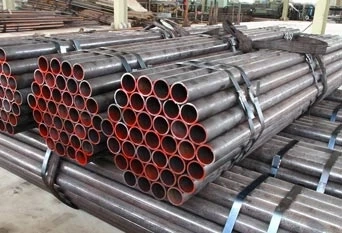Chrome Moly P9 Pipes
Chromium, molybdenum, and occasionally vanadium are later added to carbon steel pipes to produce ASTM A335 Grade P9 Alloy Steel Pipes, often known as chrome moly pipes. For high temperature service applications, alloy steel pipes made to ASME specifications are employed. Alloy steel pipes manufactured in accordance with ASTM A335 Grade P9 are fully annealed, isothermally annealed, or normalised quenched and tempered. The A335 P9 Chemical Composition of Alloy Steel Pipes is standard, with additions of 8.00–10.00 Chromium and 0.90–1.10 Molybdenum. with a 415 Mpa minimum tensile strength The minimum yield strength for ASTM A335 Grade P9 Pipes is 205 Mpa.
A335 P9 Chemical Composition
The chemical constituents that make up the a335 p9 are silicon, carbon, phosphorus, 9% chromium, 1% molybdenum, and manganese. These metals improve the material\'s tensile and yield strengths, boost overall strength, and lessen the possibility of welding cracking.
Steel\'s corrosion resistance is improved and prevented from oxidising at high temperatures by the chromium content. This component also contributes to the strong resistance to air corrosion of A335 P9 alloy pipe that has been externally coated with either Black Oil Paint or Anti-Corrosion Oil.
At room temperature, the a335 p9 alloy steel tubing is recognised to have strong tensile, yield, and hardness qualities. It is the best option for fusion welding as well as bending, flanging, and other forming operations.
Uses of Chrome Moly P9 Pipes
Power stations, petrochemical facilities, and oil fields are just a few of the places where chrome moly P9 pipes are employed. They are the perfect option for the high-temperature service of these industries because of their superior tensile strength and corrosion resistance.
Two essential components, chromium (Cr) and molybdenum, make up the A335 P9 Chemical Composition of Chrome Moly goods (Mo). Cr improves tensile, yield, and hardness qualities at normal temperature, making it perfect for preventing oxidation in high temperature applications.
Mo improves steel\'s strength, elastic limit, wear, impact, and hardenability. It also increases resistance to softening, controls grain growth, and, in some circumstances, lessens embrittlement. Additionally, it improves high temperature creep strength, corrosion resistance, and pitting prevention.



